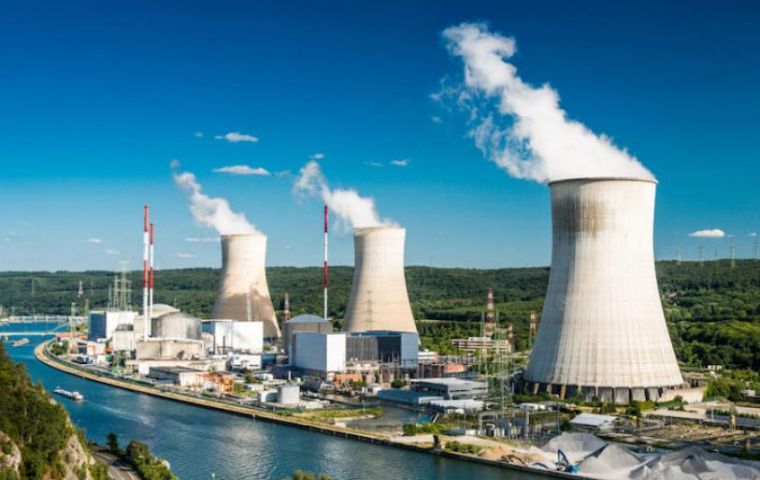MercoPress. South Atlantic News Agency
Gas and nuclear energies and the green economy: furious debate in Europe
 Under EC new rules, certain nuclear and gas projects can be labeled sustainable “transitional activities.”
Under EC new rules, certain nuclear and gas projects can be labeled sustainable “transitional activities.” Are gas and nuclear clean energies in the drive to a green economy? The controversy has triggered a furious debate in the European Commission following proposed rules that, in effect under certain conditions, the two energies can be labeled “green investments”.
“Taking account of scientific advice and current technological progress, the Commission considers that there is a role for private investment in gas and nuclear activities in the transition,” the Commission said in its announcement.
The EU has officially committed to producing no net greenhouse gas emissions by 2050 — a target which has shown is necessary worldwide to prevent the worst effects of climate change. By 2030, the EU plans to slash emissions by more than half compared to 1990 levels.
To reach those goals, the bloc will need a grid that runs on carbon-free energy. But how much of that mix will consist of renewables like wind and solar versus more controversial energy sources like nuclear energy and gas is still up for debate.
Nuclear energy comes with concerns about accidents and what to do with radioactive waste. The gas industry, meanwhile, has sold itself as a cleaner-burning alternative to other fossil fuels — but recent research has shown that it’s more polluting than previously thought because of methane leaks. Methane, which makes up a majority of ‘natural gas,’ is a greenhouse gas, 25 times as potent as carbon dioxide.
Under the Commission’s new rules, certain nuclear and gas projects can be labeled sustainable “transitional activities.” That means they’re supposed to help phase out dirty energy sources. The provisions outlined by the Commission include a 2030 deadline to get construction permits for new gas projects that limit their emissions and replace coal. New nuclear plants eligible to qualify as a sustainable investment would need to secure their construction permits by 2045.
These new requirements represent an effort to classify nuclear energy and gas according to the EU Taxonomy, a set of guidelines for investors, to prevent green-washing by defining what’s considered sustainable.
Those in favor of considering nuclear and gas sustainable under the right conditions say the technologies are needed to provide a consistent source of power when there isn’t abundant sunshine and wind. In the future, advanced batteries could solve that limitation with solar and wind energy. But in the meantime, there are already existing nuclear and gas power plants that can step in to keep the grid reliable, proponents say.
The controversy swirling around nuclear energy, in particular, pits France against Germany and Austria. France already sources more than 70% of its electricity from nuclear plants (making it more reliant on nuclear energy than any other country in the world), and is planning to build more nuclear reactors to hit its climate targets. Germany, on the other hand, plans to shut down all of its nuclear plants by the end of the year. Austria, which has also opposed an expansion of nuclear energy, threatened to take legal action against the new rules.
The new rules will go into effect in 2023 unless enough member states or Members of the European Parliament vote to block them. So far, apparently about 250 MEPs have committed to blocking the rules, At least 353 votes are needed to stop the measures from moving forward.




Top Comments
Disclaimer & comment rulesCommenting for this story is now closed.
If you have a Facebook account, become a fan and comment on our Facebook Page!